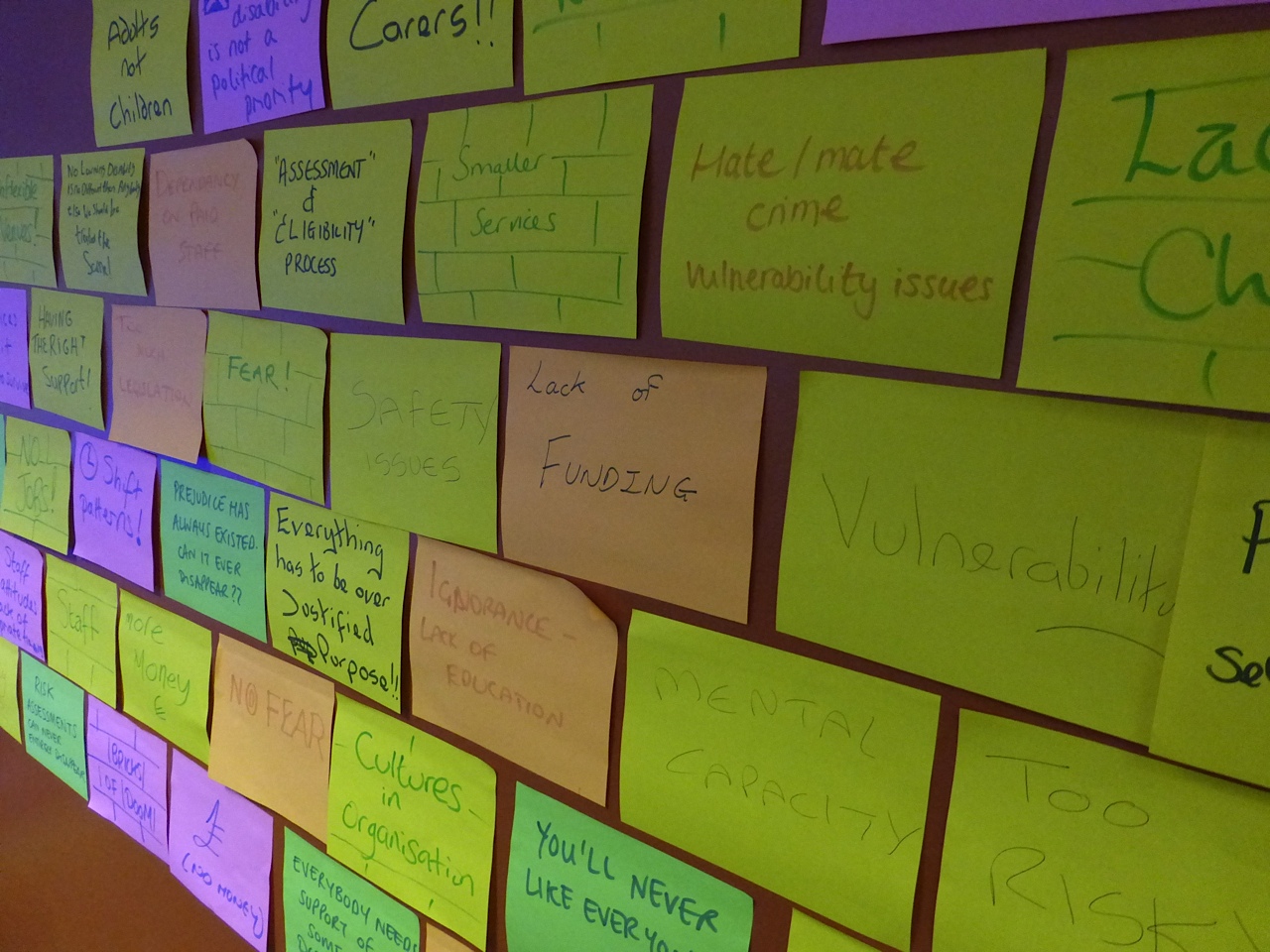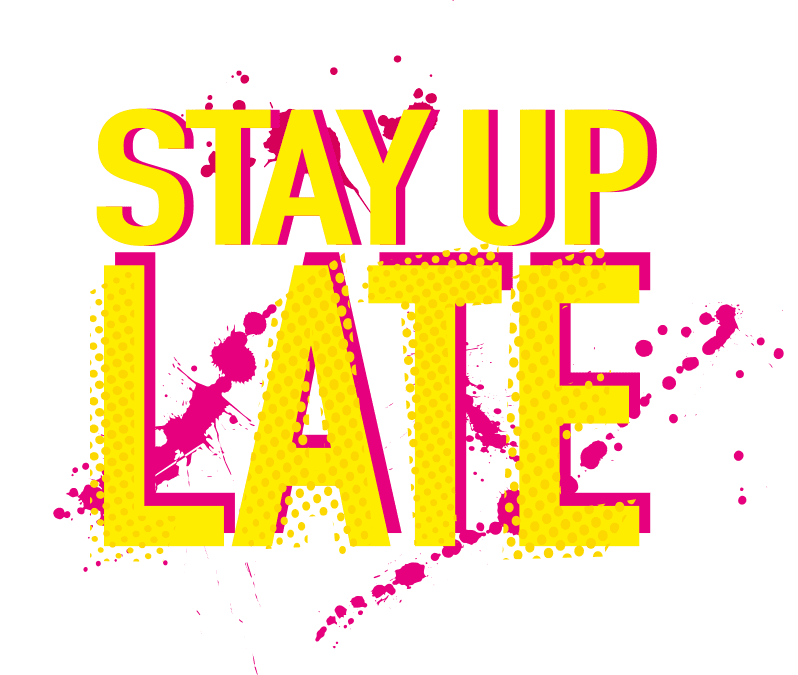
10 reasons why people with learning disabilities don’t have great lives…
…and what we can all do about it.
Removing the blocks & creating a manifesto for change

Last year our friends at BILD (The British Institute of Learning Disabilities) asked us to run workshops at their annual conference in Birmingham, which we repeated at he Learning Disability Wales conference in Newport.
This enabled me to wear both my hats at once – with Stay Up Late and our aims to enable people with learning disabilities to be fully involved in their local communities and in my role at Southdown Housing enabling people with learning disabilities to take the lead on improving the quality of support services.
You can read more about these sessions here but the long term aim was to try and come up with a ‘Manifesto For Change’ saying what needs to change for people with learning disabilities to lead the lives they really want.
I must apologise for the amount of time it’s taken me to try and condense all the ideas down and come up with something from these workshops. They were incredible sessions with so many ideas coming out, emotional stories being shared and an overwhelming desire to make things change for the better. We’re not denying these are difficult times and so it was amazing to experience such energy for making positive change.
These sessions were all built around talking about those impossible blocks that simply can’t be removed and get in the way of people leading the lives they really want, and how we can remove them. Here’s the run down of those top 10 blocks:
1) Risk and fear of scrutiny
Being risk averse, being swamped by risk assessments, the fear of litigation, a culture of blame and those dreaded ‘health and safety issues’.
How can we change this?
Sharing risk, being positive about risk and asking ourselves what the risk is of not having a great life?
2) Attitudes and societal issues
The issues facing people with learning disabilities are not seen as a political issue. The education system doesn’t help and there’s a lack of understanding in the wider community. Additionally there is the worrying number of incidents around hate and ‘mate’ crime.
The media also doesn’t help with high profile personalities using terms like ‘retard’, ‘window licker’, ‘spaz’ and ‘mong’.
On top of this it was felt that there are a lack of advocacy services, a move away from the social model of disability as more pressure is put on services. However, as my colleague Andrew, who was co-facilitating the session (and talking about his work as a peer-reviewer) said: “Nobody with a learning disability is no different from anybody else. We should be treated the same!”
How can we change this?
Let people get angry, campaign for more advocacy support and give people with learning disabilities mentoring support around campaigning.
Let’s politicise the issues, and have high expectations of our local communities to help effect change (as we’ve discovered with our amazing Gig Buddies volunteers).
Lets find ways to enable people with learning disabilities to be teachers and leaders, creating role models.
And for us all to take responsibility for challenging negative words and portrayals wherever we see them (in the street, pub, bus – in the media and social media) making a concerted effort to challenge and remove negative labels.
3) Work cultures
This is something dear to our hearts as it’s very much where Stay Up Late came from originally. So what are the issues?
Inflexible support staff, rigid rota systems, disinterested staff and managers who don’t create a culture that encourages flexibility and creativity. Then there’s that ‘tick-box’ mentality (or ‘thinking inside the tick-box’), there being no sense of values in staff teams and organisational cultures where we’re in danger of creating new institutions (regardless of the size of the service). On top of that there’s the feeling that we’re employing the wrong kind of staff and there’s too much talk and not enough action. So lots of people saying ‘we do person centred support’ – but not really thinking about what that means.
How can we change this?
Getting the right staff with people with learning disabilities leading on the recruiting, training and appraising of their staff.
Having positive and open management who are committed to change and continual improvement working in a way that looks at solutions and not the problems. And of course enabling people with learning disabilities to be fully involved in the quality checking of their own services.
4) Inadequate support provision
The main issues discussed were: A lack of suitable housing, the constant reorganising of services and the suggestion that care can’t be totally flexible. This is compounded by a dependency on paid staff, a lack of funding and poorly paid staff. There was also a feeling that we don’t make the best of available resources, and staff cover is always shorter at weekends. There was also unanimous feeling within all the workshops that the Coalition’s austerity cuts are really hurting people extremely hard, and that urgent work needs to be done by the Government to address this and undo the real damage that is being done.
How can we change this?
We need a radical shift from ‘services’ to community.We’ve also got to remember that Stay Up Late started as a campaign 2 years before the global banking crash so we need to be careful not to blame austerity for everything – there were clearly cultural problems in support services long before 2008.
We need to give people with learning disabilities much more information about how their money is spent, and what support they can buy. There needs to be a proper use of personal budgets and people with learning disabilities also need to be fully involved in the design and delivery of their services.
We also need to find creative ways to promote the value of sometimes poorly paid staff, improving their workplace and making sure we attract the right kind of staff who can bring value to their work and receive something of value in return (it’s not all about money).
If it doesn’t work then break it! ‘Rip it up and start again’
5) Individual circumstances
It was acknowledged that when supporting people with learning disabilities there will always be individual circumstances that make getting a great life more complicated. Issues such as mental capacity, being vulnerable to hate and mate crime, having a lack of choice (and not being able to access information to inform choices) and past experiences.
How can we change this?
Generally it was felt that if we get everything else right than these things will become less of an issue, but also there needs to be much better understanding around mental capacity and supporting people to make their own decisions.
6) Personal budgets
It was felt there really isn’t enough support for people who want to take control of their own budgets.
How can we change this?
In many ways this one should be easy – we just need to improve access to information about personal budgets. However, being an avid reader of Mark Neary’s blog that seems to be only half the story – there also needs to be a radical improvement of the system. (Although we acknowledge it may well be working well in other areas).
7) Employment
There is obviously an ongoing issue around support to access employment opportunities and ‘Access to Work’ excluding people on certain benefits. In addition there’s also further complications around claiming benefits plus the lack of jobs.
How can we change this?
More work could be done to engage with employers, and potential employers to promote creative thinking. Additionally more could be done to share inspiring success stories to create cultures that are solution focussed.
8) Commissioning
The issue here is that it was felt far too many services are designed by officials in local authorities without creating a system that truly meets the needs of people on the receiving end of these services.
How can we change this?
By creating a contracting and commissioning system which encourages and rewards proper flexibility around support and starts from a point of real personalisation. Additionally it was felt that commissioners should stop buying services from profit making providers.
9) Exhaustion
The final theme that came out of these workshops was exhaustion – we’ve been talking about these issues for so long and there doesn’t appear to be too much changing, plus there’s real pressure on services from funding cuts.
There was also the feeling that people with learning disabilities don’t have a strong voice in the UK, and some people present said they never will.
How can we change this?
We need to find ways to enable people with learning disabilities to be able to campaign and have a higher profile. We also need to find a way to share our successes and give each other hope that things can change for the better.
10) Responsibility
This issue didn’t actually come up in the workshops but I thought a blog which was a Top 9 of things would look a bit weird. This issue is really about us all taking personal responsibility for making change happen. Those of us who work supporting people with learning disabilities can all give examples of poor support and bad work cultures. However, we can also come up with examples of brilliant people doing brilliant things.
How can we change this?
We need to find a way to share our stories, inspire each other and create change. Not once the austerity measures have ended, right here, right now!
So in many ways we can look at all the above as depressing stuff, but it really reflected the mood in the room, and also that’s not to say there was a mood of despondency, there was also a real desire to bring about meaningful and long lasting change.
So what are the next steps?
Well for one we’re going to publish our draft manifesto for change but we want your input. So please get in touch – add your comments, share your ideas, get political and get active.
We’re also going to work on a plan to reignite the Stay Up Late campaign and will be asking for your input and involvement on this over the coming months (join our mailing list to make sure you’re kept in the picture).
If you’ve got to the end of this thank you and please get in touch with your thoughts.
Paul


